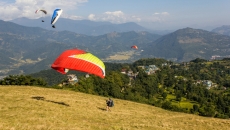A conservation group says its latest purchase of exclusive hunting rights in a British Columbia rainforest is a major step toward protecting the area's wildlife, but hunters say the move is an "abuse" of the licensing system.
The Raincoast Conservation Foundation, based in Sidney, B.C., said Thursday that it raised $1.92 million over two years to buy the rights from hunters that covers roughly a quarter — or 18,000 square kilometres — of the Great Bear Rainforest on the province's north and central coast.
Raincoast's guide outfitter co-ordinator Brian Falconer said the group has fulfilled all aspects of the purchase except the physical transfer of the hunting licenses, a process that is being completed.
The province confirmed in a statement that it has received the application to transfer the certificate, and the transaction was being reviewed.
Falconer said they will continue to buy more hunting rights to achieve the ultimate goal of eliminating commercial trophy hunting completely in the Great Bear Rainforest.
The purchase makes Raincoast the largest hunting tenure holder in B.C., covering more than 56,000 square kilometres.
"Literally hundreds of animals every year, including particularly the trophy species like grizzly bear, black bear, wolves, cougars, those are the real trophy species, those are not being killed now," he said.
He said it assures there are healthy populations of animals, particularly carnivores, all through the Great Bear Rainforest.
Raincoast has been buying hunting rights in the province since 2005, after a 2001 moratorium on grizzly bear hunting approved by an NDP government was overturned when the Liberals were elected to government.
The province again brought in a ban on grizzly hunting in 2017 after the NDP returned to power, but Falconer said Raincoast will continue its efforts because there are many other species the group can protect by controlling hunting tenures.
"We are required to do hunts in order to maintain these territories at this point," Falconer said.
"We've been very unsuccessful at those hunts, and so the harvest rate has gone down to zero in those properties, " he said. "We just have very, very poor hunters."
In the place of commercial hunting, Raincoast has been encouraging ecotourism in the regions where they hold tenure, another intentional move that Falconer said is aimed to show the economic potential of a sustainable industry based on wildlife.
"It is lighting the path to a new, conservation-based economy that is not dependent on killing and extracting things," he said.
Raincoast's purchases, however, have upset the group Hunters for B.C., which says the move amounts to abusing commercial licensing to stifle legal hunting activities.
The group's president Robin Unrau said the 2017 ban on grizzly hunting put several outfitters in a difficult financial situation, which gave conservation groups like Raincoast an opportunity to the buy tenures from hunters with the plan to not hunt.
"Whether they're taking them out hunting physically or whether it's just on paper to look good, it should be written better that a hunting tenure is for the purpose of hunting and not as we say just going through the motion on paper and using this propaganda," Unrau said.
He said the move to limit commercial hunting also isn't addressing the key challenge facing species like the grizzly, which is habitat protection.
Unrau said hunting, when done responsibly, is actually a key tool in maintaining biodiversity and balance in a given region, and Hunters for B.C. are members of the Fish, Wildlife and Habitat Coalition that play a role in conservation efforts.
"Protectionism is fantastic," he said. "It has to have its time and place.
"There's always two sides to a story; if conservation organizations or environmental groups choose not to really look at the big picture, which is the habitat. If we're not able to look at that, I think it's a failure on all our part for the wildlife."






